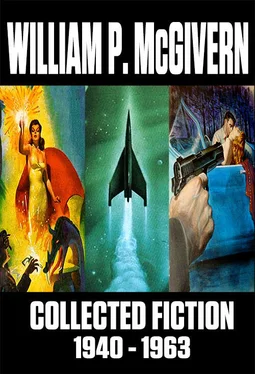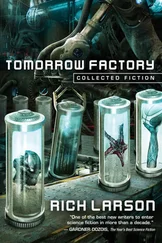Уильям Макгиверн - Collected Fiction - 1940-1963
Здесь есть возможность читать онлайн «Уильям Макгиверн - Collected Fiction - 1940-1963» весь текст электронной книги совершенно бесплатно (целиком полную версию без сокращений). В некоторых случаях можно слушать аудио, скачать через торрент в формате fb2 и присутствует краткое содержание. Год выпуска: 2014, Издательство: Jerry eBooks, Жанр: Ужасы и Мистика, Фантастика и фэнтези, Детектив, Прочие приключения, на английском языке. Описание произведения, (предисловие) а так же отзывы посетителей доступны на портале библиотеки ЛибКат.
- Название:Collected Fiction: 1940-1963
- Автор:
- Издательство:Jerry eBooks
- Жанр:
- Год:2014
- ISBN:нет данных
- Рейтинг книги:3 / 5. Голосов: 1
-
Избранное:Добавить в избранное
- Отзывы:
-
Ваша оценка:
- 60
- 1
- 2
- 3
- 4
- 5
Collected Fiction: 1940-1963: краткое содержание, описание и аннотация
Предлагаем к чтению аннотацию, описание, краткое содержание или предисловие (зависит от того, что написал сам автор книги «Collected Fiction: 1940-1963»). Если вы не нашли необходимую информацию о книге — напишите в комментариях, мы постараемся отыскать её.
Collected Fiction: 1940-1963 — читать онлайн бесплатно полную книгу (весь текст) целиком
Ниже представлен текст книги, разбитый по страницам. Система сохранения места последней прочитанной страницы, позволяет с удобством читать онлайн бесплатно книгу «Collected Fiction: 1940-1963», без необходимости каждый раз заново искать на чём Вы остановились. Поставьте закладку, и сможете в любой момент перейти на страницу, на которой закончили чтение.
Интервал:
Закладка:
It was a picture of a man who was ruthless and cunning. A man who thought clearly and measured his chances shrewdly. And that was where the inconsistency became apparent; the image was streaked with flaws, something was out of place, something incongruous. Because the killer had done something foolish...
“What’s the matter with you?” Trask said.
O’Leary put both hands over his ears; the traffic on the pike rushed by like a river of noise and light, and he tried to shut out the sound of it, tried furiously to find the truth that was hidden somewhere in this maze of facts and hunches, of inferences and intuitions. Then it was as if a clear and brilliant light had snapped on in his mind; then he had it.
He caught Trask’s arm. “The dead man. Nelson; he’d had his dinner, right? He had left the restaurant and walked to his car. But there was a coffee container beside his body. And one of those little cardboard things they put hot dogs in. Remember?”
“Sure,” Trask’s dark face was impassive; but a flicker of understanding came to his eyes. “Go on.”
“Those containers belonged to the killer,” O’Leary said. “He ate and drank there beside Nelson’s car. Then he dropped them on the ground.”
“Which means he went into the restaurant after all,” Trask said, his voice sharpening. “But you told me you checked out the waitresses. They should have remembered a guy without a hat or coal on a night like this.”
“I didn’t check all of them,” O’Leary said. He suddenly felt sick with guilt and apprehension. “I talked to the hostess. She’d have spotted anybody who wanted a table. Then I went to the take-out counter. But I only questioned one of the girls on duty. I— I forgot about the other one.”
“You forgot?” Trask said sharply. “What do you mean by that?”
“She’s a friend of mine, Sheila Leslie.” O’Leary drew a deep breath. “I was more interested in her than my job, that’s all, lieutenant. But I wasn’t after a murderer then. I was after the owner of a stalled car. Which is no excuse.”
“I guess it’s not,” Trask said. “But you’ve put us back on the right track. We’ll find the girl who sold him that coffee. When we know what he looks like, we’ll seal off this pike till it’s damn near watertight. I’ll call Captain Royce on the way. Let’s go.”
O’Leary ran toward his car. The killer must have bought his coffee from Sheila, he realized; if he hadn’t done that one compulsive, dangerous thing, they might never have got a line on him. He could have drifted through their nets like a wisp of smoke. And then O’Leary remembered something that caused a strange coldness to settle in his stomach; the killer had corrected one mistake. He had got rid of the Edsel. Would he try to correct his other mistake — by getting rid of the only witness who could identify him?
O’Leary snapped on his red beacon and jammed his foot hard on the accelerator.
X
Harry Bogan sat in the rear seat of Alan Perkins’s sedan, which was now parked close to the entrance of Howard Johnson’s No. 1. He was smiling softly; they had made two U-turns in doubling back to the restaurant, and for all the attention they received they might have been lazily circling about a sleepy village on a Sunday evening. He held his gun so that it pointed at Perkins’s head. “We’ll have to wait until a car pulls in alongside us,” he said. “You remember what you’re to tell the driver?”
“Yes, I remember,” Perkins said.
“You’re a good boy. I don’t want to hurt you.”
They were close enough to the restaurant for Bogan to see the dark-haired girl at work behind the take-out counter. She was slim and cool and swift in her while uniform, her skin smooth and glowing under the bright light, her teeth flashing now and then in quick smiles. They meant nothing, he knew, and fell his heart speeding with anger. A bone thrown to a hungry dog, nothing more. The smile that told of her real feelings wouldn’t be squandered on the lonely and miserable persons lined up at her counter. She would save that for the trooper, inviting him with her eyes and lips into the warm, selfish circle of her love.
They did not have long to wait, A small, middle-aged man in a leather jacket pulled in beside them and climbed from his car.
“All right,” Bogan said quietly. Perkins rolled the window down and called to the man. “Pardon me, sir, but would you do me a favor?”
The man turned, peering into the darkness toward Perkins’s voice. The shadows blurred Perkins’s face and obscured Bogan completely. The man came a step closer. “Well, if I can, I don’t mind,” he said in a soft Southern accent.
“There’s a waitress inside I want to send a message to.” Perkins said. “You can see her from here — she’s the dark-haired one at the take-out counter.”
The man glanced toward the restaurant, nodding slowly. “I see her all right. Just what kind of a message is it?”
“Just tell her Trooper O’Leary wants to see her outside for a second.”
Bogan smiled in the darkness; the trooper’s name had been a gift, a priceless bit of luck, and he accepted it as a talisman of success.
“Trooper O’Leary, is that it?” the man said. “Well, I’ll tell her for you.” He laughed softly. “Man taking messages to pretty girls can get in a fix of trouble sometimes. But this is kind of different.”
“Listen to me, for heaven’s sake,” Perkins said to Bogan, as the stranger walked with a leisurely gait toward the restaurant. “It won’t work. She’ll be frightened; she’s liable to scream or something.” He turned his head slowly, cautiously, until he could see the shine of Bogan’s glasses. “Please, there’s no need — to hurt anybody I’ll take you anywhere you want to go. You can ride in the trunk. I give you my word of honor.”
“I don’t need your help to get off the turnpike,” Bogan said, laughing softly. “Now you just do as I told you. When she gets that message, you drive up and stop in from of the entrance. Keep the motor running. That’s all you’ve got to worry about.” He prodded the boy’s cheek with his gun, sharply, cruelly. “Do you understand?”
“Yes, all right.” Perkins barely whispered the words.
They watched the man in the leather jacket make his way through the crowded restaurant to the take-out counter. He removed his hat and raised a hand to get the dark-haired girl’s attention.
The girl smiled at him, and when he spoke she leaned forward slightly, her head tilted slightly to one side. She glanced toward the windows; the man had gestured in that direction, obviously telling her where he had received the message. The girl gave him a quick, warm grin then and came swiftly around the counter and walked toward the revolving doors of the restaurant, one hand pushing at a stray curl on her forehead. She stopped briefly to speak to the hostess. Asking permission to step outside for a moment or so, Bogan thought, smiling faintly. A very proper little girl, obedient and responsible. She was moving again, walking toward the entrance.
“All right,” he said quietly.
Perkins backed his Ford out of line, then cut the wheels and drove toward the entrance, which was marked as a no parking area. The revolving doors glittered as they spun around, and the girl came out onto the broad sidewalk. An awning protected her from the rain, but the cold wind whipped the skirts of her white uniform about her slim legs.
Perkins stopped, and Bogan reached forward and opened the front door. The girl came toward the car, bending to look into the dark interior. “Dan, is that you?” she said, in a clear, unworried voice.
Bogan glanced quickly out the rear window. A family was hurrying toward the restaurant, a mother, father and four small children, but the parents were involved in shepherding their charges and paid no attention to the stopped car and the girl standing beside it.
Читать дальшеИнтервал:
Закладка:
Похожие книги на «Collected Fiction: 1940-1963»
Представляем Вашему вниманию похожие книги на «Collected Fiction: 1940-1963» списком для выбора. Мы отобрали схожую по названию и смыслу литературу в надежде предоставить читателям больше вариантов отыскать новые, интересные, ещё непрочитанные произведения.
Обсуждение, отзывы о книге «Collected Fiction: 1940-1963» и просто собственные мнения читателей. Оставьте ваши комментарии, напишите, что Вы думаете о произведении, его смысле или главных героях. Укажите что конкретно понравилось, а что нет, и почему Вы так считаете.

![Уильям Макгиверн - Завтра опять неизвестность [английский и русский параллельные тексты]](/books/35168/uilyam-makgivern-zavtra-opyat-neizvestnost-angli-thumb.webp)









